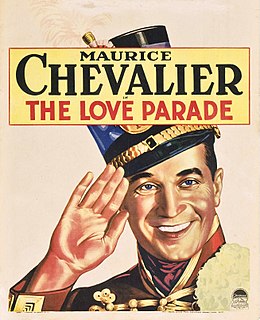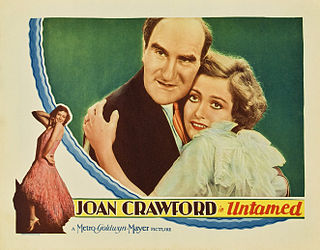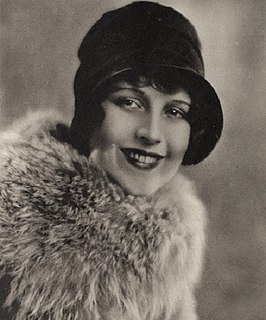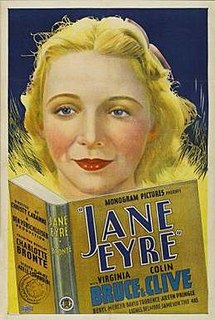
The Love Parade is a 1929 American pre-Code musical comedy film, directed by Ernst Lubitsch and starring Maurice Chevalier and Jeanette MacDonald, involving the marital difficulties of Queen Louise of Sylvania (MacDonald) and her consort, Count Alfred Renard (Chevalier). Despite his love for Louise and his promise to be an obedient husband, Count Alfred finds his role as a figurehead unbearable. The supporting cast features Lupino Lane, Lillian Roth and Eugene Pallette.

Naughty Marietta is a 1935 American musical romance film based on the 1910 operetta of the same name by Victor Herbert. Jeanette MacDonald stars as a princess who flees an arranged marriage. She sails for New Orleans and is rescued from pirates by Captain Richard Warrington.

Walter Davis Pidgeon was a Canadian-American actor. He earned two Academy Award for Best Actor nominations for his roles in Mrs. Miniver (1942) and Madame Curie (1943). Pidgeon also starred in many films such as How Green Was My Valley (1941), The Bad and the Beautiful (1952), Forbidden Planet (1956), Voyage to the Bottom of the Sea (1961), Advise & Consent (1962), Funny Girl (1968), and Harry in Your Pocket (1973).

Mary of Scotland is a 1936 RKO film starring Katharine Hepburn as the 16th-century ruler Mary, Queen of Scots. Directed by John Ford, it is an adaptation of the 1933 Maxwell Anderson play, with Fredric March reprising the role of Bothwell, which he also performed on stage during the run of play. The screenplay was written by Dudley Nichols. Ginger Rogers wanted to play this role and made a screen test, but RKO rejected her request to be cast in the part feeling that the role was not suitable to her image.

Playing Around is a 1930 American pre-Code drama film with songs, starring Alice White, Chester Morris and William Bakewell. It was adapted from the story "Sheba", written by Viña Delmar. The film was produced and distributed by First National Pictures, a subsidiary of Warner Bros.

Ernest Torrence was a Scottish film character actor who appeared in many Hollywood films, including Broken Chains (1922) with Colleen Moore, Mantrap (1926) with Clara Bow and Fighting Caravans (1931) with Gary Cooper and Lili Damita. A towering figure, Torrence frequently played cold-eyed and imposing villains.

Dinner at Eight is a 1933 American pre-Code comedy-drama film directed by George Cukor from a screenplay by Frances Marion and Herman J. Mankiewicz, based on George S. Kaufman and Edna Ferber's 1932 play of the same title. The film features an ensemble cast of Marie Dressler, John Barrymore, Wallace Beery, Jean Harlow, Lionel Barrymore, Lee Tracy, Edmund Lowe, and Billie Burke.

Untamed is a 1929 American pre-Code Metro-Goldwyn-Mayer romantic comedy drama film directed by Jack Conway and starring Joan Crawford, Robert Montgomery, Ernest Torrence, Holmes Herbert, Gwen Lee, and Lloyd Ingraham. The script was adapted by Sylvia Thalberg and Frank Butler, with dialogue by Willard Mack, from a story by Charles E. Scoggins.

Claudia Dell was an American showgirl and actress of the stage and movies.

Bride of the Regiment is a 1930 American Pre-Code musical film directed by John Francis Dillon and filmed entirely in Technicolor. The screenplay by Ray Harris and Humphrey Pearson is based on the book of the 1922 stage musical The Lady in Ermine by Frederick Lonsdale and Cyrus Wood, which had been adapted from the 1919 operetta Die Frau im Hermelin by Rudolph Schanzer and Ernst Welisch. The story is a remake of a 1927 First National silent film, The Lady in Ermine, that starred Corinne Griffith. It was later remade by 20th Century-Fox as That Lady in Ermine (1948) starring Betty Grable and Douglas Fairbanks, Jr.

I Cover the Waterfront is a 1933 American Pre-Code romantic drama film directed by James Cruze and starring Ben Lyon, Claudette Colbert, Ernest Torrence, and Hobart Cavanaugh.

John Stuart, was a Scottish actor, and a very popular leading man in British silent films in the 1920s. He appeared in three films directed by Alfred Hitchcock.

June Collyer was an American film actress of the 1920s and 1930s.

Doctor in Clover is a British comedy film released in 1966, starring Leslie Phillips. The film is based on the novel of the same title by Richard Gordon. It is the sixth of the seven films in the Doctor series.

Monte Carlo is a 1930 American pre-Code musical comedy film, directed by Ernst Lubitsch. It co-stars Jack Buchanan as a French Count Rudolph Falliere masquerading as a hairdresser and Jeanette MacDonald as Countess Helene Mara. The film is notable for introducing the song "Beyond the Blue Horizon", which was written for the film and is first performed by MacDonald and a chorus on the soundtrack as she escapes on the train through he countryside. Monte Carlo was hailed by critics as a masterpiece of the newly emerging musical film genre. The screenplay was based on the Booth Tarkington novel Monsieur Beaucaire.

David Torrence was a Scottish film actor. He appeared in more than 100 films between 1913 and 1939. He has a star on the Hollywood Walk of Fame. He was the brother of actor Ernest Torrence. He was born in Edinburgh, Scotland and died in Los Angeles, California. He is interred at Inglewood Park Cemetery.

Jane Eyre is a 1934 American romantic drama film directed by Christy Cabanne, starring Virginia Bruce and Colin Clive. It is based on the 1847 novel Jane Eyre by Charlotte Brontë, and is the first adaptation to use sound.

She Loves Me Not is a 1934 American comedy film directed by Elliott Nugent and starring Bing Crosby and Miriam Hopkins. Based on the novel She Loves Me Not by Edward Hope and the subsequent play by Howard Lindsay, the film is about a cabaret dancer who witnesses a murder and is forced to hide from gangsters by disguising herself as a male Princeton student. Distributed by Paramount Pictures, the film has been remade twice as True to the Army (1942) and as How to Be Very, Very Popular in (1955), the latter starring Betty Grable. The film is notable for containing one of the first major performances of Bing Crosby, and it helped launch him to future stardom. This was also the last film that Miriam Hopkins made under her contract to Paramount Pictures, which began in the early 1930s upon her arrival in Hollywood. In 1935, the film received an Academy Award nomination for Best Original Song for "Love in Bloom", theme song of comedian Jack Benny.
Celtic Thunder: Storm is the title of both a CD album and DVD that was released on 20 September 2011 by the musical group Celtic Thunder. This article relates mostly to the DVD, which is worthy of mention because unlike Celtic Thunder's other DVDs, which are filmed versions of their touring concerts, Storm is a full theatrical production.

Agnes Castle was a Victorian era Irish author who worked with both her sisters and husband. The stories that she co-wrote were the basis of several plays and films.



















